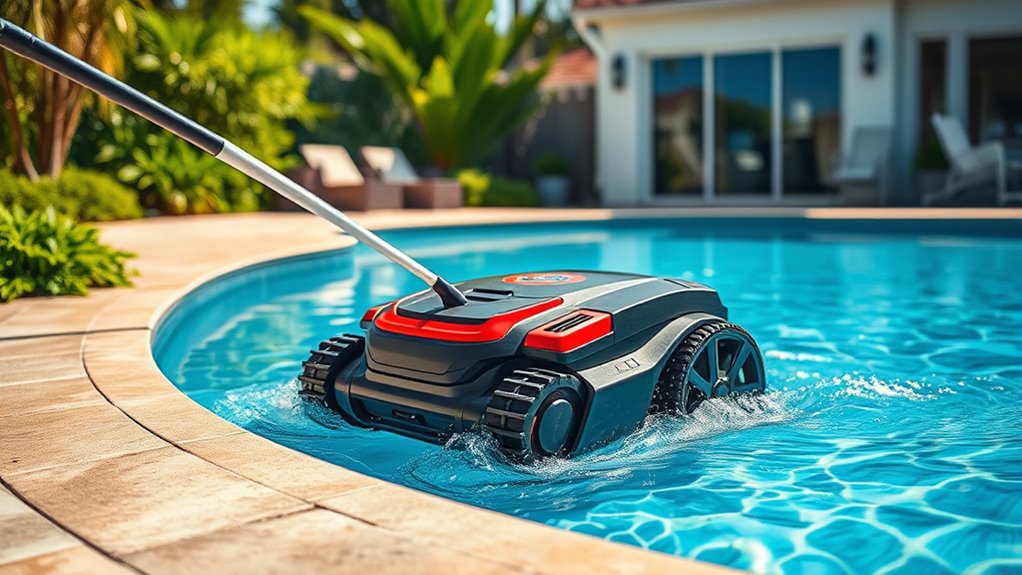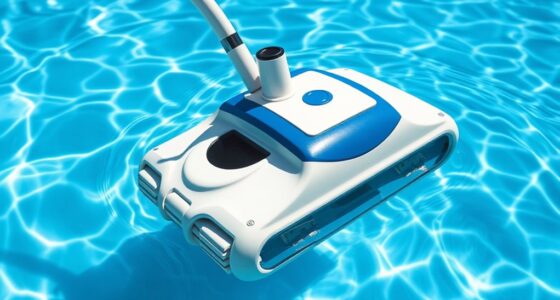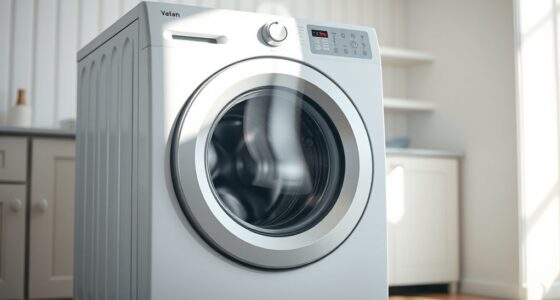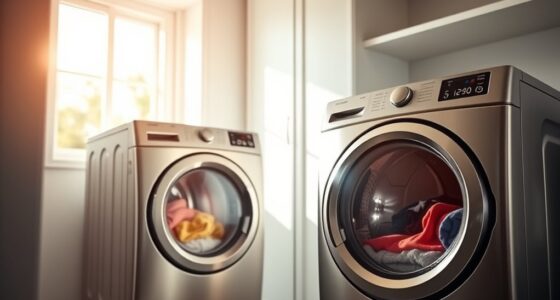Many pool owners prefer pressure pool cleaners because they’re simple, reliable, and cost-effective. They connect directly to your pool’s existing filtration system, using water pressure to move and clean efficiently without extra energy or complex parts. These cleaners can handle large debris and reach tricky spots, making maintenance easier. If you want to discover how this straightforward approach can save you time and money, keep exploring what makes pressure cleaners a popular choice.
Key Takeaways
- They are simple, reliable, and require minimal troubleshooting or maintenance.
- Use existing pool pressure, eliminating extra power or batteries, making them energy-efficient.
- Handle large debris effectively and clean large surface areas quickly.
- Cover hard-to-reach spots and pool walls thoroughly due to their effective pressure technology.
- Offer a cost-effective, durable alternative to robotic cleaners with fewer parts and lower repair needs.
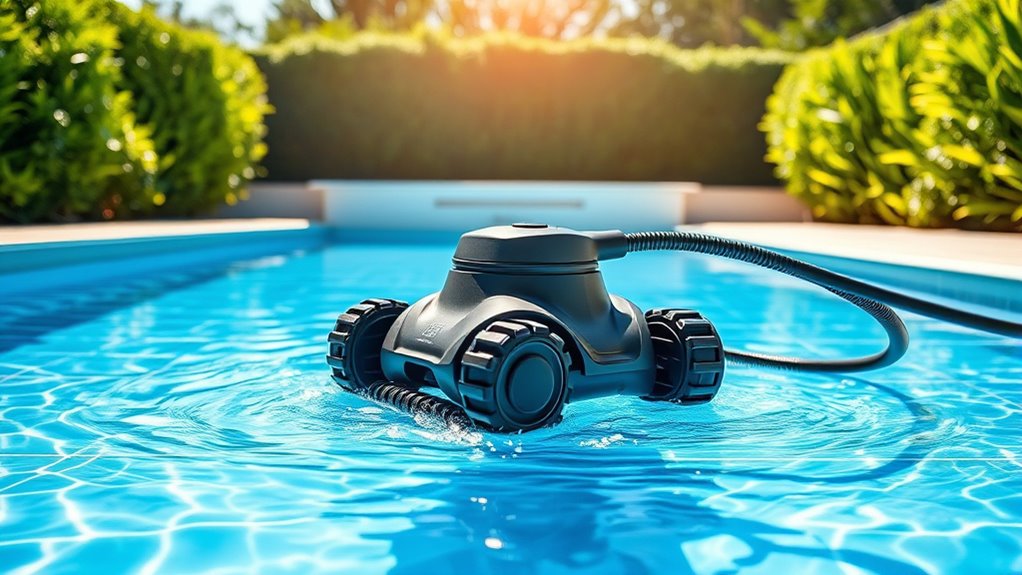
Are you tired of spending hours manually cleaning your pool? If so, you might be considering different types of pool cleaners, and pressure pool cleaners could be on your radar. These devices have been popular for years, mainly because they offer reliable, automatic operation that many pool owners find convenient. Unlike robotic cleaners that run independently, pressure pool cleaners connect to your pool’s existing filtration system, using water pressure to power their movement. This means once you set them up, they do the work for you, scrubbing away dirt, debris, and algae without your constant supervision. Their automatic operation makes maintenance simpler, freeing up your time for more enjoyable activities rather than tedious chores.
One of the key reasons why some owners prefer pressure pool cleaners is their energy efficiency. These cleaners utilize the existing water pressure from your pool’s pump, which means they don’t require a separate power source or complex electrical components. Because they rely on your pool’s filtration system, they tend to consume less energy compared to robotic models that run on dedicated motors and batteries. This energy-efficient design can translate into lower operational costs over time, especially if you already have a powerful pump in place. Plus, since pressure pool cleaners are generally simple in design, they tend to have fewer parts that might wear out or need repairs, contributing to long-term savings and reduced maintenance expenses. Additionally, their straightforward operation often makes them easier to troubleshoot and maintain, which is a plus for many pool owners. Furthermore, advancements in pressure technology have improved the effectiveness and reliability of these cleaners, making them a preferred choice for many. In fact, ongoing innovations in automated pool cleaning have further increased their efficiency and user satisfaction.
Pressure pool cleaners are energy-efficient, using your pool’s existing pump to save on costs and maintenance.
Another advantage of pressure pool cleaners is their durability and ability to handle large debris. They’re built tough, often made with sturdy materials that can withstand harsh pool environments. This makes them especially appealing if you have a lot of leaves, twigs, or larger debris in your pool. Their design allows them to cover large surface areas quickly, ensuring your entire pool gets cleaned without missing spots. Additionally, the way they operate ensures thorough scrubbing of pool walls and floors, making them effective even in pools with complex shapes or hard-to-reach corners. A well-designed pressure cleaner will also have adjustable settings to optimize cleaning performance based on your pool’s specific needs.
While robotic cleaners have gained popularity for their independence and technological features, pressure pool cleaners continue to be favored by many for their simplicity, reliability, and cost-effectiveness. If you value automatic operation combined with energy efficiency, then a pressure pool cleaner could be the perfect choice for your pool maintenance needs. They offer a practical, straightforward solution that keeps your pool clean without draining your energy or your wallet, making them a trusted option for many pool owners. Moreover, understanding the beneficial ingredients in some models can enhance their cleaning efficiency and skin-friendliness.
Frequently Asked Questions
Are Pressure Pool Cleaners Suitable for All Pool Types?
Pressure pool cleaners aren’t suitable for all pool types. Your choice depends on your pool size and debris types. For larger pools or those with heavy debris like leaves, pressure cleaners work well, providing efficient cleaning. However, if your pool has fine debris or tight corners, a different cleaner might be better. Always consider your pool’s specific needs to guarantee ideal cleaning and avoid unnecessary hassle.
How Often Should I Maintain a Pressure Pool Cleaner?
You should perform manual maintenance on your pressure pool cleaner regularly, ideally once a month, to guarantee peak performance. Keep an eye on the cleaning frequency, adjusting it based on pool usage and debris levels. Check for clogs, clean the filter, and inspect hoses to prevent issues. Regular maintenance keeps your cleaner running smoothly, extending its lifespan and maintaining a sparkling pool.
Do Pressure Cleaners Work Well in Large Pools?
You’ll find that pressure pool cleaners work well in large pools because they use powerful jets to improve pool filtration and debris removal. Their consistent movement helps cover extensive areas effectively, ensuring your pool stays clean. Plus, by maintaining good water flow, they prevent clogging and enhance filtration efficiency. So, if you want thorough cleaning, pressure cleaners are a reliable choice for large pools.
Can Pressure Pool Cleaners Remove Algae Effectively?
Like a gentle storm, pressure pool cleaners can effectively remove algae when used properly. They work by dislodging algae from surfaces, but you might find they require some chemical assistance for thorough algae removal. Relying solely on pressure cleaners can increase your chemical dependency, so combining them with proper water chemistry guarantees better results. This way, you keep your pool clean without overusing chemicals or missing algae patches.
Are Pressure Pool Cleaners Energy-Efficient Compared to Robotic Cleaners?
Pressure pool cleaners generally use less energy than robotic cleaners, making them more energy-efficient. Their lower energy consumption translates to reduced operational costs over time. You’ll find that pressure cleaners rely on your pool’s pump, which you might already be running, so they don’t require extra power. This efficiency appeals to pool owners looking to save money while maintaining a clean pool without considerably increasing energy use.
Conclusion
So, if you’re still torn between pool cleaners, remember that pressure pool cleaners are the superheroes of spotless pools. They’re powerful, reliable, and can tackle dirt like a tornado on steroids. Don’t settle for less when your sparkling pool deserves the best. Trust me, once you see the flawless clean they deliver, you’ll wonder how you ever managed without one. Embrace the pressure and make your pool the envy of the neighborhood!
